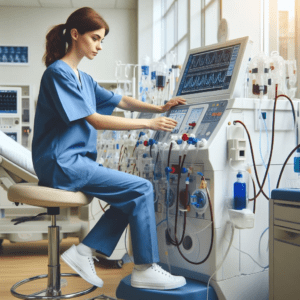Bachelor of Vocation (B.Voc) in Dialysis Technology is a specialized undergraduate program designed to train students in the field of renal dialysis, focusing on the operation, maintenance, and management of dialysis equipment and procedures. This program aims to equip students with the necessary knowledge, skills, and practical experience to work effectively in dialysis centers, hospitals, and healthcare facilities. Below is a detailed description of the program:
- Duration: The B.Voc program in Dialysis Technology typically spans three years, divided into semesters.
- Curriculum: The curriculum covers a wide range of topics related to renal physiology, kidney diseases, hemodialysis, peritoneal dialysis, dialysis equipment, infection control, patient care, and medical emergencies. It integrates theoretical knowledge with practical training to prepare students for professional practice in dialysis technology.
- Clinical Training: Emphasis is placed on hands-on clinical training through internships, practical sessions, and supervised clinical rotations in dialysis centers and hospitals. Students gain practical experience in setting up dialysis machines, monitoring patients during dialysis sessions, troubleshooting equipment malfunctions, and providing quality patient care.
- Specializations: Some B.Voc programs may offer specializations or elective courses in areas such as pediatric dialysis, home dialysis, acute dialysis, chronic kidney disease management, and transplant coordination, allowing students to focus on specific aspects of dialysis technology.
- Certifications: Upon completion of the program, students may be eligible to obtain certifications such as Certified Clinical Hemodialysis Technician (CCHT) or Certified Dialysis Technician (CDT) to demonstrate their competency and qualifications in the field.
- Core Subjects:
– Anatomy and Physiology of the Kidneys
– Renal Diseases and Disorders
– Principles of Dialysis
– Hemodialysis Procedures
– Peritoneal Dialysis Techniques
– Dialysis Equipment and Technology
– Infection Control and Sterilization
– Patient Assessment and Monitoring
– Medical Emergencies in Dialysis - Specialization Electives (Sample):
– Pediatric Dialysis
– Home Dialysis Programs
– Acute Dialysis Care
– Chronic Kidney Disease Management
– Transplant Coordination
– Dialysis Nutrition and Dietetics
– Psychosocial Aspects of Dialysis - Clinical Training Modules:
– Dialysis Center Operations
– Dialysis Machine Setup and Calibration
– Dialyzer Selection and Blood Flow Monitoring
– Vascular Access Management
– Complications of Dialysis and Intervention Strategies
– Patient Education and Counseling
– Dialysis Care Planning and Documentation
– Quality Assurance and Patient Safety - Professional Skills Development:
– Communication Skills with Patients and Healthcare Team
– Empathy and Compassion in Patient Care
– Critical Thinking and Problem-Solving in Clinical Scenarios
– Teamwork and Collaboration in Multi-Disciplinary Settings
– Ethical and Professional Conduct in Healthcare Practice
– Continuous Learning and Professional Development
- Technical Skills: Proficiency in operating and troubleshooting dialysis machines, understanding dialysis principles and procedures, and ensuring the safe and effective delivery of dialysis therapy.
- Clinical Competence: Ability to assess patient needs, monitor vital signs, recognize signs of complications, and respond appropriately during dialysis sessions.
- Patient-Centered Care: Compassionate and empathetic approach to patient care, effective communication with patients and families, and advocacy for patient well-being and comfort.
- Problem-Solving Abilities: Analytical thinking skills to identify and address technical issues, patient concerns, and clinical challenges in dialysis practice.
- Teamwork and Collaboration: Working collaboratively with healthcare professionals, including physicians, nurses, dietitians, and social workers, to provide comprehensive care for dialysis patients.
- Adaptability and Flexibility: Ability to work in dynamic and fast-paced healthcare environments, handle emergency situations, and adapt to changes in patient condition or treatment plan.
- Professionalism and Ethics: Upholding ethical standards, confidentiality, and respect for patient autonomy, rights, and dignity in all aspects of dialysis practice.
- Continuous Learning: Commitment to ongoing professional development, staying updated on advances in dialysis technology, evidence-based practice guidelines, and regulatory requirements in the field.
- Dialysis Technician/Technologist: Performing dialysis procedures, monitoring patients during treatment, maintaining dialysis equipment, and providing patient care in dialysis centers, hospitals, and clinics.
- Dialysis Nurse: Providing nursing care and support to dialysis patients, including vascular access management, medication administration, patient assessment, and education on dialysis procedures and self-care.
- Dialysis Center Manager: Overseeing the operations of dialysis centers, including staffing, scheduling, budgeting, quality assurance, and regulatory compliance.
- Clinical Educator: Training and educating dialysis technicians, nurses, and other healthcare professionals on dialysis technology, procedures, and patient care best practices.
- Dialysis Equipment Sales and Service: Working for medical equipment companies as sales representatives, technical support specialists, or service engineers for dialysis machines and supplies.
- Research Assistant: Assisting in research studies and clinical trials related to dialysis technology, patient outcomes, and treatment modalities in academic institutions or healthcare organizations.
B.Voc in Dialysis Technology is a specialized program that prepares students for rewarding careers in renal dialysis and healthcare. By providing a comprehensive curriculum, hands-on clinical training, and opportunities for specialization, the program equips graduates with the knowledge, skills, and professional competencies needed to excel as dialysis technicians, nurses, managers, educators, or researchers. With a focus on patient-centered care, clinical excellence, and continuous learning, graduates are well-prepared to make a positive impact on the lives of dialysis patients and contribute to the advancement of renal healthcare.
